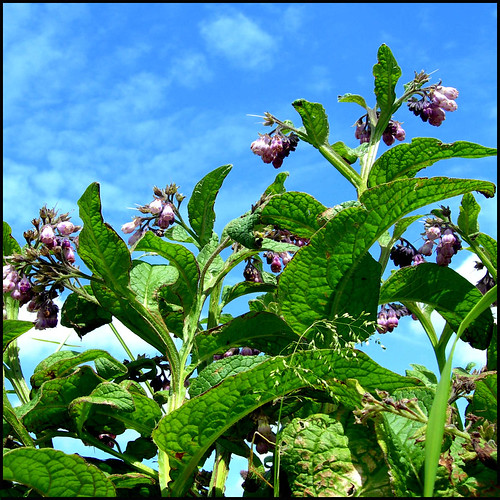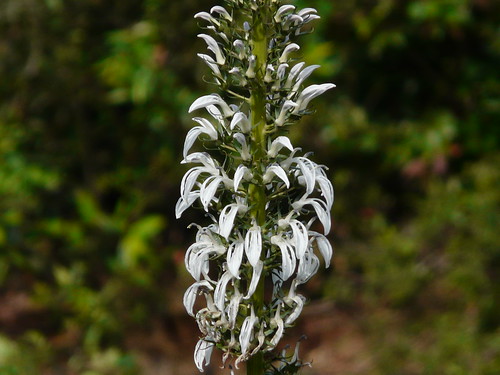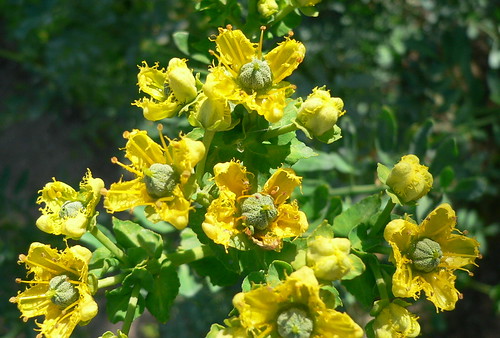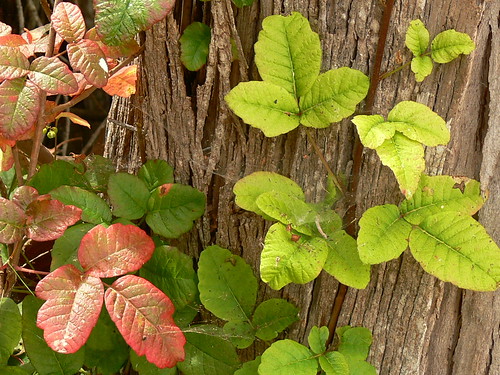"Are there any herbs you should avoid making tea from?"
Some of those I'm describing in this post. Thank you for your question, Owen! :)

Photo of Comfrey herb - courtesy of ESOX LUCIUS
First of all a couple of general rules to follow - just to be on the safe side:
- only use an herb if you know for sure what it is - some plants are poisonous
- when buying, choose a reliable merchant that sells organic, fair-trade herbs
- avoid using tea that causes unpleasant reactions - unless you're under supervision of a licensed practitioner
- pregnant and lactating women should completely stay away from certain herbs

Photo of Lobelia nicotianifolia courtesy of dinesh_valke
Although Comfrey herb (top photo) historically has many uses for topical applications, it also contains certain alkaloids that could cause permanent damage to liver when used for an extended period of time/continuously.
Lobelia herb contains toxins that are similar in effect to those of niccotine.
These warnings and sometimes even the lists of prohibited plants vary from country to country. According to Wiki "The UK currently does not require natural products such as herbs to have any evidence concerning their efficacy, but does treat them technically as food stuff and require that they are safe for consumption."

Photo of Poison Ivy - courtesy of Martin LaBar (going on hiatus)
You might have heard about the Poison Ivy plant becoming more and more poisonous and causing stronger allergic reactions than ever before. Some researchers suggests that it might be thriving on polluted air. As an interesting fact, in 1900' this same plant was commonly sold as a decorative house plant for its beautiful leaves...
Similar, from reading different reports on the same herb from different parts of the world, I realized that a plant that has a pretty minor warning like "it might cause skin irritation to people with sensitive skin" sometimes has a potential to become a much stronger irritant when growing in subtropical climate conditions. An example is Rue herb (Ruta graveolens) - another beautiful plant.

Photo of Rue herb - courtesy of Luigi FDV
Another beauty out here is Foxglove, often grown as an ornamental plant for its showy flowers. However, the entire plant is poisonous (a nibble is said to be enough to potentially cause death), including seeds and roots. At the same time, a group of active compounds are extracted from (mostly) the leaves of this herb to produce a medicine by the name of "Digitalin".

Photo of Digitalis purpurea (Common Foxglove, Purple Foxglove or Lady's Glove) - courtesy of Mclaire2
The last plant I'd like to highlight in this post is Poison Oak. Named most likely for the oak-like shape of its leaves and very unpopular in parts of northern California/west coast of U.S. - because of its toxicity that can cause a severe skin rash. It can grow as a shrub or a vine.

Photo of Poison Oak - courtesy of goingslo
In short, different plants have different effects on different people - therefore using herbs for medicinal purposes should be supervised by practitioner who is trained and licensed.
***

16 comments:
Fox glove certainly. I have come across people trying to use this based on some old cure-all recipe. Also rhubarb leaves.
Thanks for that .. that was really informative :)
That was interesting information. I didn't know about comfrey being an issue for ingestion. I have a number of natural skin products w/comfrey in in and it has soothing properties.
Good question Owen, and GREAT answers! This is so informative, thanks!
Wow - you're definitely someone I'd like to take with me on a nature walk... :)
On a side note, I don't think I'm allergic to poison ivy. I've never had it, even though I've been exposed to it through other people. My dad's never had it either. Now, I've never gone rolling around in it or anything, but usually people get it by association at camp, and I never did.
I had no idea foxglove was so poisonous. Thanks for the information. They sure are beautiful for being so wicked.
Most of these I knew about, but this was very informative and important information. Thanks for sharing.
The Foxglove is one of my favorite plants for it's showy flowers and I grow them as they seem to be one of the few the deer won't eat.
Now, how did the deer get that smart?
Thanks for all this information - you did a wonderful job educating us and backed it up with great pictures.
I just knew about all of these after reading your post, thanks for sharing the information.. It's very informative!
I have a history of violent allergic reactions to things that only cause mild problems for most folks, so I tend to be very cautious about any new food substance.
Adding to my growing list of things that might take the shine off of my impending move to Texas: poison ivy and poison oak, both of which have caused me misery in years past.
We were camping a long time ago and hiking. Crossing a creek, I slipped and my hand must have brushed against poison oak. Immediate PAIN! I think I was lucky, because the stream we were crossing was icy cold. I plunged my hand into the water and just let it freeze. Thankfully, it must have been the immediate action of the ice water because I had no further "complications." That's my guess at least - thank goodness!
Great post, thank you for all your information!
Happy New Year Daria
I thought that all herbs were medicinal, but if some are poisonous how do you define what a herb is? Have you a good definition please?
Thanks for the information, you are very well versed on herbs and plants I will have to stop back when I have more time.
Thanks for the education and the cautions! This is sure to save and/or help many, many of your readers and visitors!
Wowie!! That is a lot of interesting stuff about those plants!! Thanks for sharing and it it best to know what you are doing when it come to plants! Amazing how pretty deadly plants can be!
Your FL furiends,
I enjoyed the information. Maybe one day you can write about what plants are dangerous for pets. Just an idea.
Post a Comment